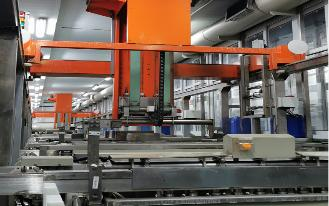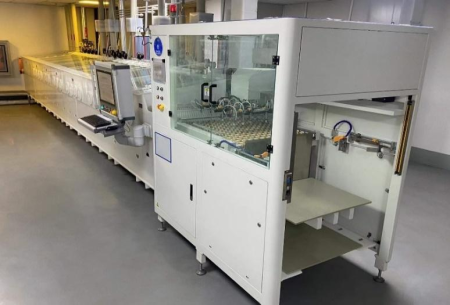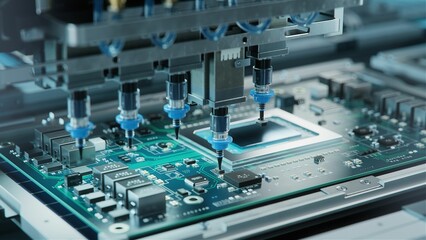- +86-755-23012705
- Building 3, Jinfeng Industrial Park, Fuyong Street, Baoan District, Shenzhen ,China
- [email protected]
In today’s fast-paced electronics industry, the demand for high-quality, efficient, and cost-effective production processes is higher than ever. Printed Circuit Board Assembly (PCBA) is a critical component in the manufacture of electronic devices, and as such, it requires precision, scalability, and reliability.
In recent years, significant advancements in automation and robotics have transformed PCBA production, streamlining workflows, improving product quality, and enhancing overall efficiency. This blog explores the roles of robots, automated assembly lines, and intelligent monitoring in revolutionizing PCBA manufacturing.
Robots have become indispensable in the modern PCBA production process. Their primary function is to enhance precision and reduce the risk of human error, which can lead to defects or inconsistencies in the final product. Robots are particularly useful in tasks such as component placement, soldering, inspection, and testing.
One of the most notable applications of robotics in PCBA is in pick-and-place machines. These robots are designed to accurately pick up tiny electronic components and place them on a PCB. The high-speed and high-accuracy capabilities of robots allow for faster production cycles while ensuring that components are placed with micron-level precision. This level of automation also enables the assembly of highly complex circuit boards with small components, which would be very difficult or time-consuming for humans to handle manually.

Robots are also essential in soldering processes. Traditional manual soldering is not only slow but also prone to human error. Automated soldering systems, such as selective soldering robots or wave soldering machines, can perform these tasks at much higher speeds while ensuring consistent and high-quality solder joints. This is especially important in industries such as automotive, aerospace, and medical devices, where reliability and safety are paramount.
Automated assembly lines have become a cornerstone of modern PCBA production. These lines integrate a series of robotic and automated systems to perform different tasks in sequence, such as component insertion, soldering, inspection, and packaging. Automation minimizes the need for manual labor, reduces operational costs, and accelerates production timelines.
One of the key benefits of automated assembly lines is their ability to increase throughput. Automated systems can run 24/7 without the need for breaks, allowing manufacturers to produce more PCBAs in less time. This is especially important in industries where time-to-market is a critical factor.
Automated assembly lines also improve consistency and quality. By utilizing machines for repetitive tasks, manufacturers can eliminate variability introduced by human workers. These systems are programmed to follow exact specifications, ensuring that each step of the process is performed to the same high standard. This uniformity is critical in the production of complex PCBAs, where even minor deviations can lead to failures in performance.

Another important aspect of automation in assembly lines is the ability to easily scale production. Automated systems can quickly adapt to changing demands, allowing manufacturers to adjust production volumes without significant downtime or reconfiguration.
Intelligent monitoring systems are a game-changer in PCBA production. These systems use sensors, cameras, and software to continuously track and analyze every aspect of the production process, from component placement to soldering quality and final inspection.
One of the most significant contributions of intelligent monitoring is its ability to detect defects in real-time. Automated inspection systems, such as AOI (Automated Optical Inspection) and X-ray inspection, are employed to verify the accuracy of component placement, solder joint quality, and overall PCB integrity. These systems use advanced imaging technology to capture detailed images of the board and compare them against a predefined set of criteria. Any discrepancies, such as misaligned components or faulty solder joints, can be identified and addressed immediately, preventing defective products from moving further down the production line.
Intelligent monitoring also plays a vital role in predictive maintenance. By collecting data from various machines and sensors throughout the production process, monitoring systems can predict when equipment is likely to fail, allowing for proactive maintenance and minimizing unexpected downtime. This not only improves the reliability of the production process but also reduces repair costs and extends the lifespan of machinery.

Furthermore, data analytics plays a crucial role in optimizing the production process. By analyzing data collected from the entire production line, manufacturers can identify inefficiencies, bottlenecks, or areas for improvement. This data-driven approach allows for continuous optimization of the production process, ensuring that resources are used efficiently and that production goals are met.
The integration of robots, automated assembly lines, and intelligent monitoring systems into PCBA production is reshaping the electronics manufacturing landscape. These technologies enhance precision, speed, and scalability, enabling manufacturers to meet the growing demand for complex, high-quality electronic products. As automation continues to evolve, the role of these advanced systems will only become more central in driving innovation and improving the efficiency of PCBA production. For companies looking to stay competitive in the fast-moving electronics industry, embracing automation and intelligent monitoring is no longer a choice but a necessity.
Your Trusted Partner for PCB Success: XPCB Limited
Let XPCB Limited be your guide to PCB success. Our comprehensive PCB manufacturing, rapid prototyping, and turnkey PCBA services are designed to meet your needs with ease. Count on us to deliver reliable solutions that exceed your expectations. With XPCB Limited, your journey to PCB excellence starts here.






XPCB Limited is a premium PCB & PCBA manufacturer based in China.
We specialize in multilayer flexible circuits, rigid-flex PCB, HDI PCB, and Rogers PCB.
Quick-turn PCB prototyping is our specialty. Demanding project is our advantage.
Tel : +86-136-3163-3671
Fax : +86-755-2301 2705
Email : [email protected]
© 2024 - XPCB Limited All Right Reserve
